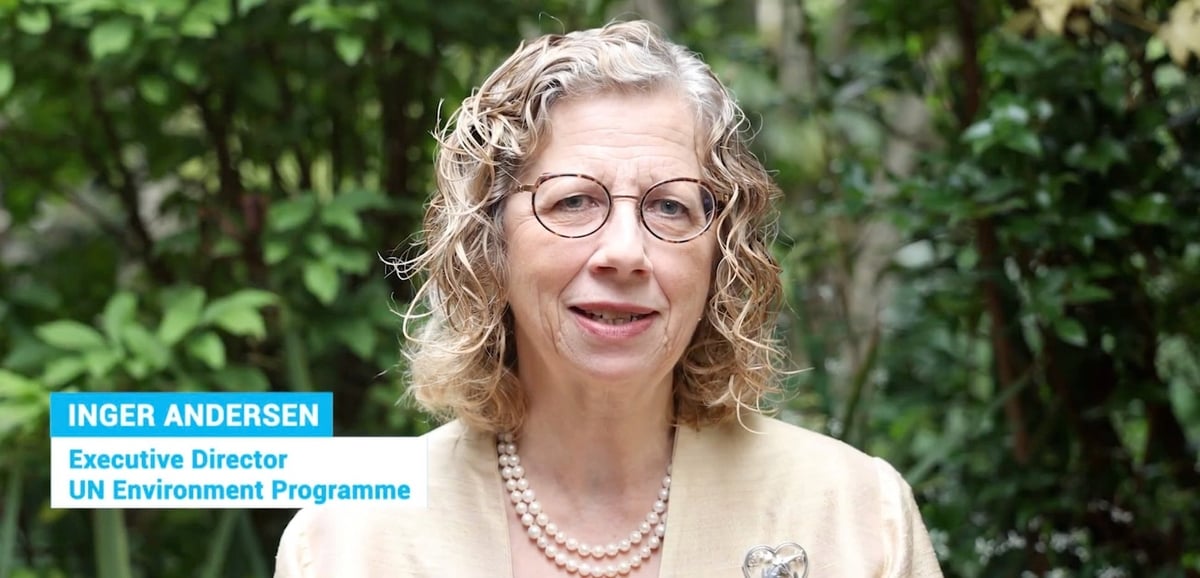December 7, 2025 | 12:02 GMT +7
December 7, 2025 | 12:02 GMT +7
Hotline: 0913.378.918
December 7, 2025 | 12:02 GMT +7
Hotline: 0913.378.918
On June 1, about 1,000 delegates from central and local authorities attended the rally to celebrate World Environment Day 2025 and launch the National Action Month for the Environment, held at 30/10 Square, Ha Long City (Quang Ninh).

Mrs. Inger Andersen, United Nations Under-Secretary-General and Executive Director of UNEP. Photo: UNEP.
The event is part of the global campaign “Beat Plastic Pollution” launched by the United Nations Environment Programme (UNEP), aiming to mobilize collective action to comprehensively manage the entire lifecycle of plastic - from design, production, and consumption to collection and recycling.
Delivering a message at the meeting, Mrs. Inger Andersen, United Nations Under-Secretary-General and Executive Director of UNEP, warned that plastic pollution is spreading at an alarming rate, threatening all ecosystems and directly impacting human health. “Plastic pollution impacts every ecosystem and every person in the planet", she said. No matter where we live on Earth, we are all affected by plastic waste.
According to UNEP, without control measures, the amount of plastic leaking into the environment could increase by 50% by 2040. Microplastics have already been found in food, water sources, and the air, posing serious health and environmental risks.
In response to this situation, UNEP has proposed the establishment of a legally binding global treaty to address plastic pollution comprehensively. The treaty will cover the entire product lifecycle, aiming for sustainable design, reduction of single-use plastics, and enhanced recycling. Over 170 countries have joined the negotiation process, with the goal of finalizing the document by 2025.
The impact of plastic pollution is evident in many developing countries, including Vietnam. It is estimated that Vietnam generates about 3.9 million tons of plastic waste annually, most of which is not properly collected or treated, especially in coastal cities and densely populated areas.
To gradually control this issue, since 2022, the Vietnamese government has issued a National Strategy on Integrated Solid Waste Management. The goals by 2030 include reducing plastic waste in the ocean by 75% and completely eliminating non-degradable nylon bags from modern retail systems.
According to the Vietnam's Deputy Minister of Agriculture and Environment Le Cong Thanh, plastic pollution is not only an environmental issue but also a test of Vietnam’s adaptability in its transition toward a circular and knowledge-based economy. Advanced technology, innovation, and strong collaboration among the government, businesses, and citizens are the keys to Vietnam transforming challenges into momentum for sustainable development.
“We call on all levels of government, the business community, and every citizen to take action. Do not remain indifferent to plastic pollution. Let us proactively build a green lifestyle - for today’s environment and a sustainable future,” Deputy Minister Le Cong Thanh emphasized.
At the meeting in Quang Ninh, numerous response activities were launched, including coastal waste collection campaigns, seminars on the circular economy and recycling models, and community communication programs aimed at reducing single-use plastic consumption.
Environmental experts emphasize that changing consumer behavior is a key factor, but it must be accompanied by policies supporting businesses producing biodegradable packaging, investment in collection and recycling systems, and improvements in waste management mechanisms.
UNEP currently serves as the main environmental authority in the United Nations, providing technical, financial, and policy planning support to developing countries. Over the years, the organization has assisted many nations, including Vietnam, in implementing waste sorting at the source, upgrading waste treatment infrastructure, and raising public awareness about environmental protection.
If adopted by 2025, the global treaty to end plastic pollution is expected to establish the first international legal framework for comprehensive plastic waste control. With active participation from the international community and countries like Vietnam, this could mark a critical turning point in the joint effort to protect ecosystems and human health from one of today’s most urgent environmental challenges.
The meeting to celebrate World Environment Day (June 5) and launch the National Action Month for the Environment 2025 was jointly organized by the Ministry of Agriculture and Environment and the People’s Committee of Quang Ninh Province, with the Vietnam Agriculture and Nature Newspaper serving as the implementing unit.
This year’s event carried the global theme “Beat Plastic Pollution,” a campaign initiated by the United Nations Environment Programme (UNEP).
The program was supported by various partners, including Petrolimex, PV GAS, Petrovietnam, TKV, Vinamilk, La Vie, VIMC, EVNGENCO1, and URENCO, among others.
Translated by Kieu Chi

(VAN) As of 2025, the ASEAN region has a total of 69 ASEAN Heritage Parks recognized across its 10 member states. Among them, Viet Nam contributes 15 ASEAN Heritage Parks.

(VAN) Yok Don National Park has high biodiversity with numerous endemic plant and animal species, and it is also the only dipterocarp forest ecosystem conservation area in Viet Nam.

(VAN) Viet Nam and Brunei signed two important MOUs on fisheries and IUU, expanding cooperation in agriculture, the environment, and Halal exports, aiming to substantively implement joint projects.

(VAN) The Viet Nam Coconut Association worked with the International Finance Corporation (IFC) and businesses to promote the supply chain, enhance competitiveness, and develop the coconut industry sustainably.
![Hue aims for Net Zero: [2] Pioneering low-emission tourism](https://t.ex-cdn.com/nongnghiepmoitruong.vn/608w/files/huytd/2025/12/04/0633-dulichzero-4-095634_236-161125.jpg)
(VAN) The ancient capital of Hue has developed Net Zero tourism products and models, aiming to reduce carbon emissions and pioneer the establishment of Viet Nam's green tourism destination.

(VAN) C.P. Viet Nam has announced the successful completion of its goal to plant 1.5 million trees during the 2021-2025 period, a key milestone within company's long-term ESG strategy and its roadmap for emission reduction.

(VAN) This is an initiative of MAE aimed at creating a unified coordination mechanism to implement agricultural cooperation programs with developing countries.